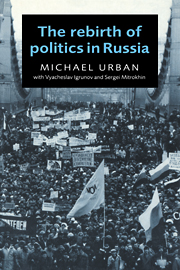Book contents
- Frontmatter
- Contents
- Preface
- Part I The pre-political context
- Part II Perestroika and the return of political life
- 3 Perestroika: renewal, transition or transformation?
- 4 Glasnost, mass media and the emergence of political society
- 5 The informal movement: politics on the margins of the soviet order
- 6 National elections and mass politics
- Part III Politics and revolution
- Part IV Ground up: politics in post-communist Russia
- Notes
- Index
4 - Glasnost, mass media and the emergence of political society
Published online by Cambridge University Press: 22 October 2009
- Frontmatter
- Contents
- Preface
- Part I The pre-political context
- Part II Perestroika and the return of political life
- 3 Perestroika: renewal, transition or transformation?
- 4 Glasnost, mass media and the emergence of political society
- 5 The informal movement: politics on the margins of the soviet order
- 6 National elections and mass politics
- Part III Politics and revolution
- Part IV Ground up: politics in post-communist Russia
- Notes
- Index
Summary
During the late 1980s, the word ‘glasnost’ entered the international lexicon. The unprecedented openness and frankness that had begun to appear on the pages of newspapers and on television screens in the Soviet Union astonished the world. Perhaps inspired by what had been achieved in the USSR, perhaps unduly idealizing this achievement, citizens of this country or that began to employ the word ‘glasnost’ themselves, obliquely suggesting thereby that if such a thing could come to pass in, of all places, the Soviet Union, then surely they had a right to demand more information, more truth-telling, from their own governments.
What was this sensation, glasnost? Our answer to this question differs fundamentally from those accounts of this phenomena known to us. The difference, however, consists solely in the manner in which the question itself is framed. Drawing from our discussion of the various ways in which perestroika has been characterized, we notice that, from the perspective of renewal, glasnost appears as a more or less conscious and deliberate strategy of the communist leadership designed to attain certain ends. Accordingly, this view tends to focus on the intentions of the leadership, the means they employed to realize them and the results of their efforts. The transitions perspective shares some of these same emphases, viewing glasnost as a strategy of liberalizers within the regime who use the mass media to strengthen their own position, both by permitting into common circulation certain information and ideas that would discredit their rivals and by appealing to potential allies in society. Each of these approaches, then, frames the question by foregrounding the role of the leadership.
- Type
- Chapter
- Information
- The Rebirth of Politics in Russia , pp. 75 - 94Publisher: Cambridge University PressPrint publication year: 1997



